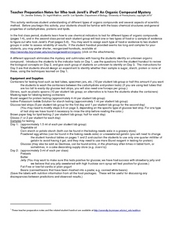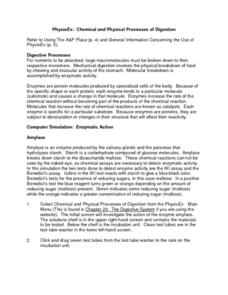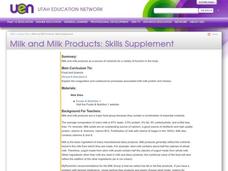Curated OER
What's Happening to Your Body
Young scholars list the types of biological development that occur during adolescence and the nutritional, physical, and mental needs that support that development. They describe careers in the field of adolescent health.
Curated OER
You Are What You Eat (The 6 Main Nutrients Found in Foods)
Young scholars study how carbohydrates, proteins, fats, vitamins, minerals and water provide basic nutrients for body growth and function. They describe quality sources of the basic nutrients and the importance of water.
Curated OER
What Nutrients Does My Body Need?
Fourth graders examine roles carbohydrates, protein, fat, and water play in maintaining healthy body, and discuss how food provides fuel (energy) to body, how much fuel body needs, how fuel is used, and what happens to unused fuel.
Curated OER
Food and Nutrition Review
Students review materials prior to taking a test that includes food preparation. After playing a version of Jeopardy as a review, they fill out lab planning sheets which detail what they plan to prepare, including ingredients and...
Curated OER
Catering Middle-School Science: Monomers, Polymers, and Macromolecules
Students investigate foods. In this biology lesson plan, students will conduct testing on different types of foods as they learn about different molecules that make them up. Students will also learn about the shapes of the molecules.
Curated OER
Dietary Supplements and the Chemistry of Life
Students study the effects of dietary supplements on bodily functions. In this health lesson plan students calculate their caloric needs and research dietary supplements.
American Heart Association
Meet the Calorie
What is a calorie and how does it work? How many calories do we consume in a typical day, and how many do our cells need to function well? Your learners will answer these questions and more using a worksheet, which includes informational...
Cornell University
The Making of Macromolecules
Compare and contrast macromolecules made from the same elements. Young scholars learn how the structure of a molecule has as much influence on a compound as the elements in the molecule. They experiment with molecular model kits to...
Curated OER
Get Fit for Yosemite - Nutrition
Pupils demonstrate an understanding of healthy eating habits and of following a fitness program. They visit Yosemite Institute.
Curated OER
Diet Evaluation Project
Students record two consecutive days of food intake. They identify which nutrients are below 70%. They compare diet composition between protein, fats, and carbohydrates. They evaluate fat in the diet to fall below the American Cancer...
Curated OER
Diet and Nutrition
Students figure out the nutritional values of foods to explain the nature of a healthy diet by looking at fast food nutrition pamphlets and calculating the values of foods then comparing them to the food pyramid.
Curated OER
Who Took Jerell's iPod?
Students investigate various substances to determine the perpetrator of a crime. In this biology lesson plan, students test for the presence of organic compounds in various samples. They identify an unknown substance based on its...
Curated OER
Understanding Food Labels
Learners determine the number of calories, serving size, and vitamins and minerals in different food products and use this information to create a formula determining the number of calories per serving size and the daily percentages of...
Curated OER
Building a Better Body
Fourth graders investigate the six essential nutrients. They read a handout, discuss the six nutrients, and construct a sandwich using ingredients that belong to the nutrient groups.
Curated OER
Popcorn Nutrition
Students read a snack nutrition chart and answer questions. They compare nutrition levels of snack foods. They correctly calculate differences in nutritional value.
Curated OER
Diet: Soup and Salad Lab
Students prepare soup and salad meals and assess their nutritional and aesthetic values. After solving soup riddles and discussing types of salads, they use meal planning forms to list ingredients and recipe information. The lesson also...
University of Georgia
The Power of Peanuts
Measure the amount of energy in a peanut by igniting a chemical reaction. Classes use a laboratory setup to burn a peanut and measure the amount of heat it releases through a temperature analysis. They calculate the number of Joules of...
Curated OER
Macromolecule Lab
During a macromolecule lab, young chemists perform multiple tests, including iodine starch tests, to determine if eight mystery foods contain lipids, sugars, or starches.
Curated OER
PhysioEx: Chemical and Physical Processes of Digestion
In this anatomy worksheet, pupils complete 22 review questions in the format of short answer, table completion, and fill in the blank after finishing an online virtual experiment about the chemical and physical processes of digestion.
Curated OER
Benefits of Nutrients
Explore the nutrients a body needs using this resource. Learners discuss the importance of the relationships between proteins, fats, carbohydrates, vitamins, minerals, and water. It's a great way to have your class talk about the healthy...
Science 4 Inquiry
The Last Supper: Identifying Macromolecules
Why do medical examiners always state the contents of a person's stomach? Scholars learn about the importance of macromolecules through a case study of stomach contents. They perform multiple tests to determine a conclusion before they...
Mascil Project
Molecular Gastronomy - Science in the Kitchen
Some say cooking is an art—and a science! Scholars scope out the savory subject of molecular gastronomy with a series of related activities. The teacher's guide contains printable worksheets and helpful tips for implementing the lesson.
Curated OER
Creating Coacervates
Students create and observe coacervates. In this origin of life lesson, students create coacervates by mixing carbohydrate and protein solutions. They observe the life-like qualities of the structures and discuss the origin of life.
Curated OER
Milk and Milk Products: Skills Supplement
Explain the coagulation and coalescence processes associated with milk protein and cheese. List the components of milk and explain how each component is dispersed in the milk. Describe what happens when milk protein is coagulated Discuss...

























